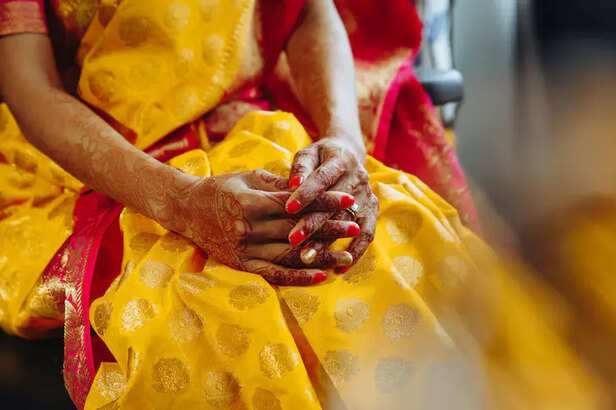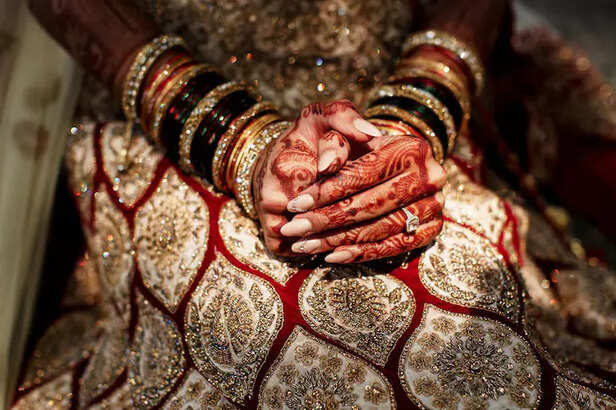Marriage Isn’t a Deadline: A New Narrative for Indian Women
Amritansh Nayak | Jun 13, 2025, 14:50 IST
In a society that views marriage as a ticking time bomb, Indian women are defying traditional expectations. By prioritizing job development, emotional preparation, and self-exploration over societal deadlines, they demonstrate that fulfillment begins with understanding oneself rather than rushing into convention.
Marriage is frequently viewed in Indian society as a deadline rather than a decision. Women, in particular, face pressure to marry young, influenced by societal timeframes rather than personal maturity. However, an increasing number of women are challenging this convention. They prioritize self-discovery, job growth, emotional maturity, and independent living before making a lasting commitment. This article delves into why marriage at your own pace—if at all—is not only acceptable, but also liberating. It's time to celebrate marriage as a personal milestone rather than a cultural finish line.

In Indian tradition, marriage is frequently viewed as a social deadline rather than a personal milestone. The temptation to marry at a "suitable age"—typically before 30, and even earlier for women—is heavily founded in cultural expectations rather than personal decision. This timeline overlooks important elements such as emotional development, financial independence, and personal preparation. Young women are routinely warned that their "biological clock" is ticking or that they will be "left behind" if they don't marry soon. Such message supports the notion that a woman's value reduces with age and that marriage is the pinnacle of achievement.
As a result, many women feel obligated to choose marriage over self-discovery, education, or professional advancement. However, life does not develop in the same manner for everyone. Some women may require additional time to heal from previous relationships, pursue their passions, or find a mate who truly values them. Choosing not to rush into marriage is not a rebellion; rather, it is a sensible, self-aware decision. It's time to stop treating marriage as a societal end goal and instead recognize it as a deeply personal choice intended to enrich rather than validate one's life.

For an increasing number of Indian women, success is no longer defined by early marriage or family responsibilities. Instead, it's about making room for self-development—professionally, emotionally, and spiritually—before making lifetime commitments. This shift reflects a deeper knowledge that meaningful connections are best formed when people know who they are and what they want. Women today are pursuing challenging careers, following their creative passions, and traveling alone—not as a form of rebellion, but as an investment in their own identities. This voyage of self-discovery promotes confidence, independence, and emotional maturity, all of which benefit relationships rather than detract from them.
Many women are understanding that settling down is an important decision that should be made with clarity and purpose. The traditional societal narrative frequently portrayed self-prioritization as selfishness. However, the next generation is demonstrating otherwise. Women are living fuller lives by choosing growth above romantic relationships. When and if they decide to commit, it is out of strength and intention rather than pressure or fear. Redefining success is accepting the notion that there is no "right age" to marry—only the best time for you.

Marriage is one of the most important decisions a person can make, but in many cultures, particularly in India, it is seen as a deadline rather than a choice. Family expectations, social timeframes, and peer comparisons can all create enormous pressure to "settle down" by a certain age. True dedication, however, should never be motivated by fear—whether it is fear of being judged, left behind, or perceived as insufficient. Emotional preparation is the true cornerstone of a long-term, fulfilling marriage. It entails knowing who you are, what you expect from a partner, and being intellectually and emotionally prepared to share your life with another person. Entering a marriage without this understanding can result in discontent, regret, or even resentment later on.
Too often, people marry to impress others or to avoid loneliness. However, those justifications are based on fleeting emotions and outward noise, rather than inner conviction. Waiting until you're emotionally grounded may take longer, but it results in healthier relationships based on trust, communication, and mutual understanding. Choosing to marry when you're ready, rather than because it's "time," is a sign of strength, not rebellion. It's about prioritizing your own journey over obsolete assumptions.
Marriage should be a deliberate, empowered decision, not a battle against age or expectations. As more women deviate from the prescribed timeframe and pursue their own paths—whether through travel, career, therapy, or reflection—they demonstrate that happiness and contentment are not restricted by marital status. Emotional preparation, not social pressure, is what creates long-lasting partnerships. When women prioritize their personal journeys over cultural noise, they redefine success—and inspire others to achieve the same, on their terms.
Explore the latest trends and tips in Health & Fitness, Travel, Life Hacks, Fashion & Beauty, and Relationships at Times Life!

delaying marriage for career
The Social Timeline Trap: Why 'Marriage by a Certain Age' is Flawed.
As a result, many women feel obligated to choose marriage over self-discovery, education, or professional advancement. However, life does not develop in the same manner for everyone. Some women may require additional time to heal from previous relationships, pursue their passions, or find a mate who truly values them. Choosing not to rush into marriage is not a rebellion; rather, it is a sensible, self-aware decision. It's time to stop treating marriage as a societal end goal and instead recognize it as a deeply personal choice intended to enrich rather than validate one's life.

rejecting marriage norms
Redefining Success: Career, Travel, and Growth Before Commitment.
Many women are understanding that settling down is an important decision that should be made with clarity and purpose. The traditional societal narrative frequently portrayed self-prioritization as selfishness. However, the next generation is demonstrating otherwise. Women are living fuller lives by choosing growth above romantic relationships. When and if they decide to commit, it is out of strength and intention rather than pressure or fear. Redefining success is accepting the notion that there is no "right age" to marry—only the best time for you.

Indian society and marriage pressure
Emotional Preparedness Against External Pressure
Too often, people marry to impress others or to avoid loneliness. However, those justifications are based on fleeting emotions and outward noise, rather than inner conviction. Waiting until you're emotionally grounded may take longer, but it results in healthier relationships based on trust, communication, and mutual understanding. Choosing to marry when you're ready, rather than because it's "time," is a sign of strength, not rebellion. It's about prioritizing your own journey over obsolete assumptions.
Marriage should be a deliberate, empowered decision, not a battle against age or expectations. As more women deviate from the prescribed timeframe and pursue their own paths—whether through travel, career, therapy, or reflection—they demonstrate that happiness and contentment are not restricted by marital status. Emotional preparation, not social pressure, is what creates long-lasting partnerships. When women prioritize their personal journeys over cultural noise, they redefine success—and inspire others to achieve the same, on their terms.
Explore the latest trends and tips in Health & Fitness, Travel, Life Hacks, Fashion & Beauty, and Relationships at Times Life!
